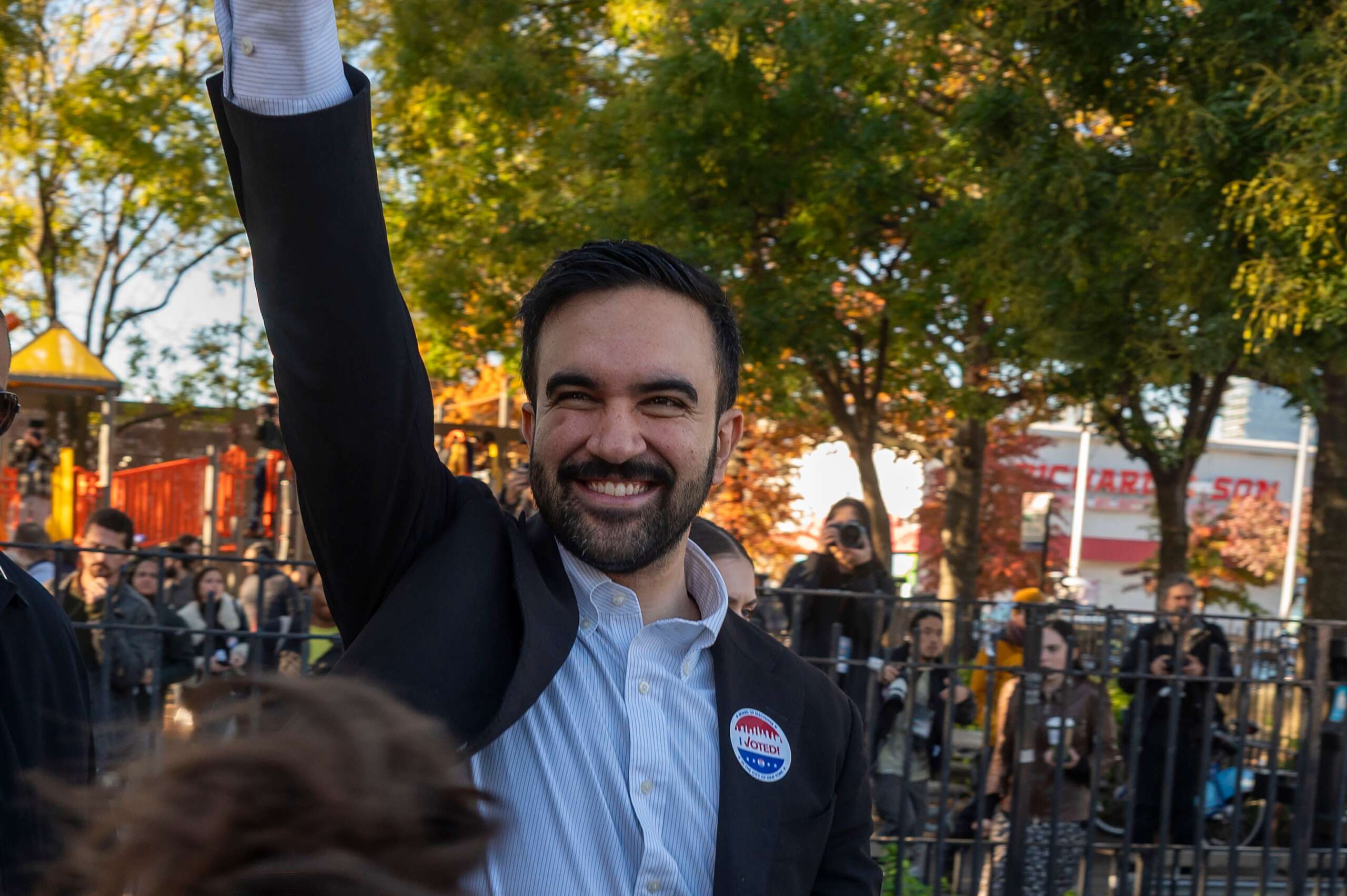This election has been defined, in part, by debate over how to address the city’s escalating affordability crisis, especially in the face of federal funding cuts.

This story was updated after original publication.
Zohran Mamdani, a State Assembly member and democratic socialist from Queens who campaigned on a pledge of affordability, won the New York City mayoralty Tuesday night. His victory makes him the first Muslim mayor in the city’s history.
It also brings a close to a race that’s drawn attention across the country—and spurred debate across the five boroughs. A historically high 2 million residents cast their ballots, the greatest number since 1969, according to the city’s Board of Elections. That far surpasses the 1.15 million voters in the 2021 general election that put outgoing, scandal-plagued Mayor Eric Adams in office.
This year’s election has been defined, in part, by debate over how to address the city’s escalating affordability crisis, especially in the face of federal funding cuts to housing programs, public benefits and other local services.
“I came to Brooklyn in the mid-’80s and lived in a two-bedroom that was $235. That same unit is now $3,000 a month. For that shoebox,” said Bushwick voter María Pagán, who voted for Mamdani. “Whoever comes to office needs to regulate these prices.”
New Yorkers on the candidates
Pagán voted for Mamdani, who handily won the Democratic primary in June on a platform that spoke directly to those concerns: he’s called for free bus service, annual rent freezes for tenants in stabilized apartments, and universal childcare for kids under 5.
“I really feel if Zohran wins—he will win—but when he wins, it’ll change stuff for real,” Mohamed Chaya, 21, a resident of Morrisania in the Bronx, told City Limits Tuesday afternoon, saying his friends have canvassed for the candidate.
Chaya’s immigrant parents got him and his sister “into politics really young,” he said, though the generations were split in this year’s race: he and his father “agree to disagree” about Mamdani and whether plans like a rent freeze are achievable.
RELATED READING: New Yorkers Vote ‘Yes’ On Housing Ballot Measures
“He’s been here for almost 30 years now, struggling trying to make ends meet, so coming from him, he finds it impossible. And I feel like that causes a big disconnect,” Chaya said. “The younger people like me, my sister, we think you [should] give it a chance. You can’t knock it until you try it. How worse can things get?”
But others remain skeptical. “The rent freeze is garbage,” said Ben, a 45-year-old Morrisania resident who did not want to share his last name. “You gotta understand—somebody has to pay, whether it be now or later.”

Mamdani’s competitors, former Gov. Andrew Cuomo (who ran as an independent) and Republican Guardian Angels founder Curtis Sliwa, also sought to cast the assemblymember’s plans as unrealistic.
Both accused Mamdani of being too inexperienced for the mayoralty—he recently turned 34—and too far left.
Ben said he was voting for Sliwa, an animal rights advocate with a colorful history best known for his subway patrols in the 1980s. On the campaign trail, Sliwa pledged to “restore law and order” and advocate for outer borough neighborhoods (including by repealing Mayor Adams’ City of Yes for Housing plan).
“We need somebody who knows our people, but doesn’t know the system enough to manipulate it. And that’s Sliwa,” Ben said.
Cuomo’s campaign had touted the former governor as the most experienced manager in the race, citing his decade at the helm in Albany and past work in the Clinton administration.

(Keke Grant-Floyd/City Limits)
The message resonated with some voters. Cuomo “knows what he’s doing,” said Floyd Monroe, 68, a security worker and tenant at NYCHA’s Brevoort Houses, who said subway and street homelessness are his top concerns. “Can’t leave the city to someone so inexperienced,” he said, of Mamdani.
But for others, Cuomo’s experience is what turned them off. The former governor weathered several scandals during his time in office, and resigned in 2021 amid accusations of sexual harassment by multiple women who’d worked with him (Cuomo has denied the allegations).
“You already know how bad he is. You already know that he’s not for us, he’s for everybody else,” Brooklyn voter Andre Sanchez told City Limits. He said he’s watched both Cuomo and Sliwa in the city’s public life for decades now (“I’ve seen what they’ve done already”), and voted for Mamdani because “he’s fresh.”
“At least he’s new,” Sanchez said. “I’m going to give him a shot, because I’m tired of the nonsense, and I’d rather have somebody else try to do something.”

New Yorkers on the issues
Sanchez, a longtime Sunset Park resident, said he’s most concerned with quality of life issues like parking, and what he described as inequities between neighborhoods when it comes to resources and city attention.
“If you go to Bay Ridge right after 65th Street, on every block on 5th Avenue, you’re gonna have a planter with a plant—alive—and a bench, two of them, on each side of the block,” he said.
RELATED READING: New York City Residents, Finish This Sentence—‘I Want My Next Mayor To…’
Others cited housing as their top issue in the race, both its costs and conditions. “They need to help us get our buildings fixed. We call and call and nothing gets done,” said Lydia Vidier, a Bushwick resident.
“Making it affordable,” said Stephanie S., who voted in Bed-Stuy. “There’s … a lot of people who are being out priced and being forced to move.”
Issa Diabate, a 58-year-old married father of four in the Bronx, said he just wanted to “vote for the person that I can believe can do something for the city.”
Tuesday’s election comes just days after 1.8 million New York City residents who rely on the Supplemental Nutrition Assistance Program (SNAP) saw their food benefits delayed as a result of the federal government shutdown.
“I hope they hear our voice,” Diabate said. “Not everybody’s a millionaire. We’re struggling to live. We’re struggling to pay the rent … we’re struggling to pay for the food.”
To reach the editor, contact Jeanmarie@citylimits.org. Want to republish this story? Find City Limits’ reprint policy here.
The post How New Yorkers Say They Voted And Why appeared first on City Limits.


